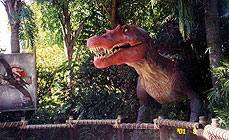|
|
|
|
Jurassic
Park III
|
 |
|
It is often said that modern, special effects blockbusters have returned movies to their earliest, fairground days: a brute cinema of attractions in which all that matters is the sensation of childlike spectacle. The Jurassic Park films seem to have been designed to prove this theory correct. With each instalment in the series, the plots carry fewer complications, the characters have less personality and the themes are less subtle. Jurassic Park III strips the idea of the series down to its minimal essence. Again and again, the characters race towards salvation – food, a clearing in the woods, shelter, rescue – and suddenly halt, as they hear the thud and whoosh of an approaching monster. A frantic race ensues, usually with one less human left at the end of the struggle. Cinema has never resembled more closely a video game in which people register as ciphers whose only function is to die or make it through to the end. Jurassic Park III delivers such basic entertainment, but on every other level it is dullsville. Like many a cop or criminal in movies, Grant (Sam Neill) – the only significant hangover from previous instalments in the Jurassic Park series – is dragged reluctantly into yet another adventure with genetically engineered dinosaurs. This time, he is employed by two thrillseekers, Paul (William H. Macy) and Amanda (Tea Leoni) for a joyride over Isla Sorna. When the plane crashes, Grant and his team discover that the couple is in fact in search of a lost son, Eric (Trevor Morgan). Billy (Alessandro Nivola) adds another complication to the mission by secretly pinching a few dino eggs. The Lost World (1997) was already a step down from the original Jurassic Park (1993), but Steven Spielberg was still in the director's chair to maximise the frightening effects of his particular brand of pure cinema: silence punctuating noise, blinding light alternating with absolute darkness, indefinite shapes and movements giving way to sudden, terrifyingly blunt apparitions. Here, director Joe Johnston (Honey, I Shrunk the Kids, 1989) stays true to the basic sadism of the narrative premise, but is unable to heighten the atmosphere of dread in true Spielbergian style. One is apt to forget that one of the models for the entire series is surely Hitchcock's The Birds (1963) – another horror movie based on fierce attacks separated by long, tense periods of waiting, but one that effortlessly combined fairground-type thrills with thoughtful speculation. Thought is definitely missing from Jurassic Park III, which is surprising given the presence in the credits of the talented writing team Jim Taylor and Alexander Payne (Election, 1999). Back in the merrier days of Jurassic Park, the darkest threat posed by the dinosaurs was their magical, evolutionary potential to change genders at will. By the third film, this subversive element has been well and truly forgotten. What worries Grant now is the dinosaurs' newfound ability to talk to each other. This generates few thrills, but leads at least to one amusing moment where Grant tries to join the prehistoric discourse. The new film also lacks Spielberg's peculiarly tormented relation to the ideal of the nuclear family. In the original, Grant's path to appreciating children came only after several gruesome set-pieces where he seemed to delight in their pain or extermination. Now, Grant's only symbolic function is to be himself a kind of dinosaur – as Ellie (Laura Dern) remarks in the course of her miserable cameo: "He's the last of his breed". In the manner of Twister (1996), Jurassic Park III also contains a listless subplot concerning the broken marriage of Paul and Amanda. In an inadvertently hilarious moment which tells you exactly what a profoundly humanist film this is, Amanda reacts to the sight of her newer partner's corpse by flinging herself into Paul's arm and declaring: "Bill doesn't matter anymore! It's our son we have to find now!" MORE Johnston: Hidalgo, Jumanji, October Sky © Adrian Martin August 2001 |
![]()